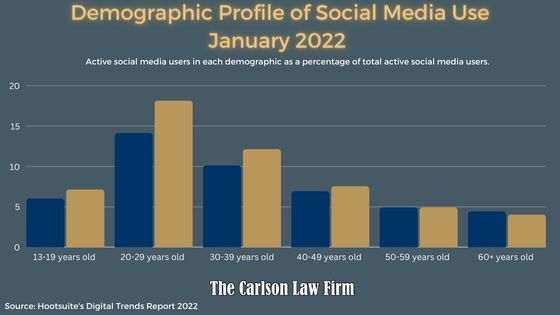As humans, we are known to be social creatures that require the companionship of others to feel like we have made progress in life. Being socially connected to others can ease stress, anxiety, and depression, help with self-esteem, provide joy and comfort, prevent loneliness, and add years to your life. On the other hand, lacking social connection can seriously impact your mental and emotional health.
Social media has made it easier than ever to connect with others no matter the distance. Many of us rely on social media platforms like Facebook, Snapchat, TikTok, Instagram, and YouTube to connect with others. Because social media has become a part of people's daily activities, researchers have studied the impact of social media and its applications on various aspects of people’s lives. Researchers have found a connection between social media and mental health, noting that users who spent more time on social media had an increase in mental health issues.
Social Media and Its Connection to Mental Health
When Facebook began, the social platform was restricted to only people with a Harvard email address. It was eventually expanded to Columbia, Stanford, and Yale. The expansion continued on to garner what is now over 2 billion users worldwide.
Since at least 2019, the company has been studying the impact of its products on its younger users’ states of mind. It has been proven countless times that its product harms a large percentage of the population, particularly teenage girls. Algorithm bias is a growing problem, as a computer system shows prejudiced results. Algorithm bias may affect teens in unforeseen ways since their prefrontal cortex is still developing.
Facebook and Other Meta Projects Lead to More Anxiety and Depression

It is understood that Instagram, with its algorithmically-driven feeds of content tailored to each user’s engagement patterns, can draw vulnerable teens into a dangerous spiral of negative social comparison and lead them to hold unrealistic ideals of appearance, body size, and body shape. Even if you know that the images you're viewing on social media are manipulated, they can still make you feel insecure about how you look or what’s going on in your own life. On the other hand, we’re all aware that people tend to share just the highlights of their lives. However, these giant platforms use algorithms to serve targeted advertisements to users to increase their click rate, which in return maximizes profits for these companies.
Almost Addictive and the Downside of Social Media Addiction
Social media affects the brain similarly to playing a slot machine. Since you don't know what content you'll be interacting with, spontaneous results cause a feeling of “reward” by releasing dopamine– the same chemical linked to other pleasurable activities such as intercourse and eating food. Like other types of behavioral addictions, using social media can be detrimental to your brain. One can use social media compulsively and excessively so that they may be accustomed to scrolling through posts, videos, and images that interfere with other areas of their life.
Ways that social media platforms keep users engaged include the following:
- Infinite scrolls
- Likes/reactions
- Engagement-based ranking
- Push notifications
It is important to recognize what unhealthy behaviors may stem from social media use. Some of the warning signs include:
- Feeling increased anxiety, depression, and/or loneliness
- Comparing yourself with others or frequently feeling jealous
- Spending more time on social media than with friends and family
- Engaging in risky behaviors or taking outrageous photos to gain likes and comments
- Noticing that your school work and relationships are suffering
- Being trolled or cyberbullied online
- De-prioritizing self-care (such as exercise, mindfulness, and sleep)
MSI and Engagement-Based Ranking Algorithm
Many users may remember the good old days when Instagram and Facebook feeds displayed posts in chronological order. However, Facebook and other social media platforms have long since made the switch to engagement-based ranking to determine which content they believe is most relevant to users’ interests. After taking into account a post's overall engagement and the user’s past interactions with similar content, the algorithm will push the content in front of that person.
Even with this knowledge of the connection between social media and mental health, Facebook has yet to act on the issue. A former Facebook employee, Frances Haugen, handed over thousands of internal Facebook documents to federal law enforcement, implying that social networks put profit over public safety. In her testimony, Haugen stated that the switch toward M.S.I made Facebook an angrier platform and created an environment that encouraged polarization, misinformation, and shocking content.
Social Media Lawsuits
Social media platforms shoulder responsibility for the potential damage their products cause after former Meta Platforms Inc. employee Frances Haugen came forward with documents about its internal operations. Among the allegations, there were claims that the company was aware that many adolescent girls using the photo-sharing app were suffering from depression and anxiety around body image issues.
Facebook failed to disclose the following to its consumers:
- Highly addictive features
- Social media’s effects on mental and physical health
- The potential risk of social media addiction
- The greater severity of harm for minors
- The alarming rates of children’s social media addiction and mental health crises
The bottom line is that social media companies made a defective product available, leading to severe mental health disorders. The companies were well aware of the damage their products caused and still decided to withhold this information from the public to continue their increase in profits.
How Can The Carlson Law Firm Help?
Social media platforms have leveraged their algorithms to exploit children's and teens' psychological and neurological vulnerabilities for their own benefit. Parents with a child younger than 19 may be able to recover compensation if their child was diagnosed or hospitalized with the following conditions:
- Self-harm
- Suicide
- Suicidal ideation
- Attempted suicide
- Anorexia
- Body dysmorphic disorder
- Binge eating
- Bulimia
The Carlson Law Firm is still in the early stage of the lawsuit investigation. It is time to hold giant social platforms accountable for placing profits over the well-being of our children. We offer free consultations to discuss what your legal rights look like. We care, and we can help.




